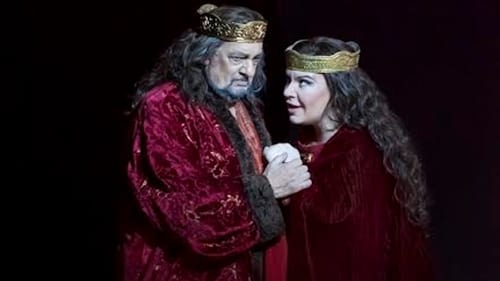
Marina
Bass René Pape, the world’s reigning Boris, reprises his overwhelming portrayal of the tortured tsar caught between grasping ambition and crippling paranoia. Conductor Sebastian Weigle leads Mussorgsky’s masterwork, a pillar of the Russian repertoire, in its original 1869 version, which runs two-and-a-quarter hours with no intermission. Stephen Wadsworth’s affecting production poignantly captures the hope and suffering of the Russian people as well as the tsar himself.

As Aragon descends into unrest, a count jealously fights for a noble lady's heart. But she has already given it to a passionate troubadour whose mother holds a terrible secret. This Verdi masterpiece overflows with dramatic tension and musical geniality, resulting in a story that increases in intensity throughout. Maria Agresta plays the unfortunate Leonora alongside Ludovic Tézier and Francesco Meli as her rival admirers in this new production at the Teatro Real.

Amneris

Bertrand de Billy conducts a cast led by Bryan Hymel and Kristin Lewis in Nicholas Hytner’s acclaimed production of Verdi’s opera on love, ambition and intrigue in 16th-century Spain.

Dalila
The opera is based on the Biblical tale of Samson and Delilah found in Chapter 16 of the Book of Judges in the Old Testament. It is the only opera by Saint-Saëns that is regularly performed. The second act love scene in Delilah's tent is one of the set pieces that define French opera. Two of Delilah's arias are particularly well known: "Printemps qui commence" and "Mon cœur s'ouvre à ta voix", the latter of which is one of the most popular recital pieces in the mezzo-soprano/contralto repertoire. Staged by greek director Yannis Kokkos and conducted by Valery Gergiev on May 25th, 2016 at the Mariinsky Theatre.

Azucena
Alex Ollé, one of the famous La Fura dels Baus, recreates the conflict and places principal protagonists in clear, transforming set with supporting lighting – facing all primal emotions directly, with no place to hide. The set design (smart and impressive solution of scenography by Alfons Flores) encased in mirrors and accented with silently moving columns, creating cloister, battlefield, cemetery or castle with minimalistic hints (impressive lighting design by Urs Schönebaum), gives us the opportunity to keep full attention on the vocal performance of main characters.

Lady Macbeth

Federica
She didn’t know his name. She didn’t know his background. But what Luisa Miller did know was that her heart belonged to the stranger Carlo as soon as she clapped eyes on him. But the secret behind Carlo’s identity is the least of her problems in Giuseppe Verdi’s star-crossed romance Luisa Miller, a tale of class, deception and betrayal set in the Alps.

Azucena
To stage Verdi's Il Trovatore, according to Arturo Toscanini, you need to bring together the four best singers in the world. This stunning production at Milan's La Scala unites four luminaries of today's opera scene to great effect: with his lilting legato, Marcelo Álvarez (Manrico) does justice to the opera's bel canto character; Franco Vassallo brings assurance and flair to the Count di Luna; Maria Agresta (Leonora) effortlessly rises to the challenges of the score; and Ekaterina Semenchuk (Azucena) also masters the most difficult notes. With the fastidious Daniele Rustioni leading La Scala's world-class orchestra, the music leads the action apace, resounding alongside the hall's legendary chorus and amid monumental sets and decor in this sublime production of one of the world's favorite operas.

La Principessa Eboli
Verdi wrote this five act opera with a French Libretto for the Paris opera. Premiere 1867. Then there are three versions of this opera, the French 1867 version, the revised Italian four Act Don Carlo 1884, plus the Modena version 1886. This version is the 1884 version with Act One reinstated, as well as the original beginning of Act 2. To complicate matters the French opera was simply translated into Italian, and then the changes were made. There is an even newer edition completed in 1980 by Ricordi, and others floating around as well.

Iolanta is a one act lyric opera, sung in Russian, by Tchaikovsky. Performed in the style of a nineteenth-century Italian melodrama, the scenes have a recitative introduction followed by a single arioso, aria, duet or chorus. Persephone is a three act melodrama, sung in French, by Stravinsky. It is a story of regeneration, symbolised in Sellars use of dancers from the Cambodian dance company, Amrita Performing Arts. Peter Sellars, one of the most innovative creators on today's stage, has linked these two productions by using the same stage setting, instantly archaic yet modern, and lit by rich colours to define the journey from darkness to light.

Marina
Stephen Wadsworth’s production of Mussorgsky’s epic masterpiece brilliantly captures the suffering and ambition of the Russian people at a critical time in their nation’s history. René Pape is riveting as the Tsar of the title, giving a commanding and charismatic performance of one of the greatest bass roles in the repertoire—his Boris is dominating, tortured, flawed and utterly unforgettable. The extraordinary cast and the Met Orchestra and Chorus are led by Russian maestro Valery Gergiev, the foremost Mussorgsky interpreter of our time.









